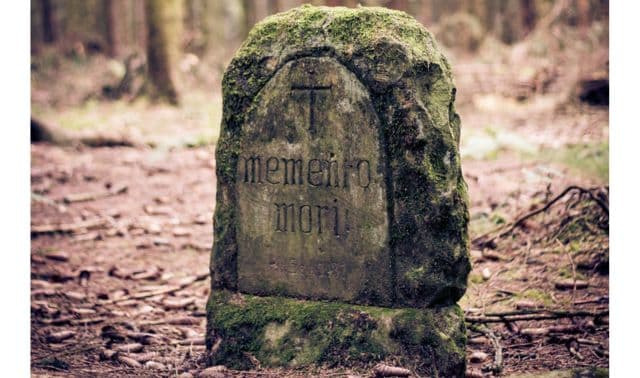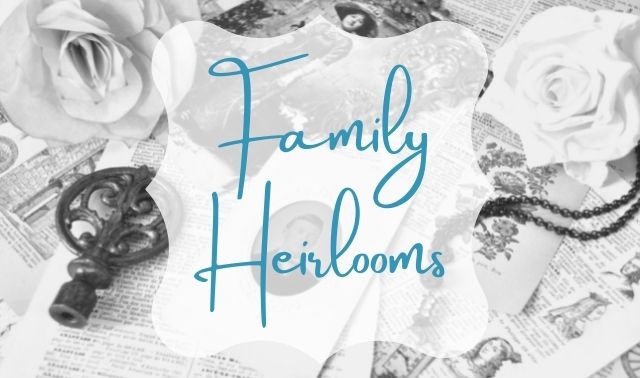Sign up for the Family Tree Newsletter! Plus, you’ll receive our 10 Essential Genealogy Research Forms PDF as a special thank you.
Get Your Free Genealogy Forms
"*" indicates required fields

My maternal grandmother loved giving me things. Designer purses, beaded sweaters, fancy shoes and the fur coats she used to don when she and my grandfather danced the night away at the Elks Lodge. On several occasions, she even told me she wanted me to have all her jewelry “when her time came.” I never really wanted any of those things—the clothes were outdated and the jewelry was mostly costume stuff—and I hated thinking about a time when my beloved grandmother would be gone.
Ironically, it was only when she died in late 2007 at the age of 88 that I realized I’d never asked her for the one thing I did want: her cedar chest. When I’d visit, we’d look through the turn-of-the-century family portraits, stacks of old black-and-white family snapshots and other memorabilia she kept in it.
The only problem was, the cedar chest wasn’t mine to have. My grandfather was still very much alive, and after his passing my mother and uncle would be the heirs. Suddenly, I became panicked about what would happen to the chest and its precious contents. Would my ailing grandfather throw it out? Would my mother or uncle want it? If they did, what would they do with it? Would they keep it or sell it at an estate sale? I wanted the chest but was afraid to ask for it. How could I, without sounding insensitive and greedy?
Unfortunately, at some time in your life you’ll likely find yourself in a similar situation. A relative will die and you’ll want to secure a personal item or two—a vintage chair, some favorite books, the family china, beloved needlework or photos and papers—that have importance to you. Such items, called non-titled property, are maybe overlooked in wills and are rarely left to anyone in particular. During the division of an estate, it’s often these unbequeathed personal belongings, not money, that cause family feuds.
So how can you preserve your family’s history without starting a brawl? Take our advice in these five common inheritance scenarios.
Scenario 1: The deceased relative with a will
Your Grandma Mae, a widow, dies and leaves a will naming your father and his three brothers as heirs. Mae’s financial assets, including the money from the sale of titled property, such as her four-bedroom Colonial home and her rarely driven Ford, are to be divided equally among her sons. Like most people, however, Mae didn’t outline in the will who would get her personal property. Among her notable belongings are a mother-of-pearl hair comb, a collection of ceramic figurines and a tallit and handmade kippah that three generations, including her sons, wore at their bar mitzvahs. Mae just assumed her boys would take what they wanted and give the rest to charity.
“This is one area that can drive wedges between family members,” says John Admire, a Miami-based estate-planning lawyer. “These things remind you of the people who are gone.” Admire says all wills should contain a residuary clause, which determines the individual or individuals who will inherit non-titled property. Once taxes and creditors are paid, those individuals are free to divide the personal property as they see fit. While the will might suggest that the distribution be in equal shares, Admire notes that beneficiaries are free to give some people more than others. If the heirs cannot agree and the will is silent on how the process is to be handled, a beneficiary can ask the probate court to intervene.
That said, in a case such as this, the best way to avoid conflict is to go through the belongings together. Sally Jacobs, owner of Jacobs Archival Services, suggests the siblings gather together at Grandma Mae’s home and do a round robin of sorts, each having a turn at picking an item to keep. “Different siblings will have different attachments to different things,” Jacobs says. The process “will work, assuming that everyone agrees that their pick is their pick … it’s not about trying to make it monetarily equal.”
If not everyone can be present to divide up things in person, Jacobs suggests a virtual round robin. One sibling should photograph and catalog all the personal belongings in the house and upload the information to a password-protected website. If this kind of free-for-all isn’t their bag, Jacobs suggests the siblings simply go item by item, deciding as a group who will keep what and which items will be sold or given to charity.
To deal with an item that more than one person wants—in this case perhaps it’s the family tallit and kippah—you may need to find a compromise. Jacobs suggests that perhaps one person could be the keeper of the religious objects, allowing the other siblings to use them as long as they return the objects afterward.
A grandchild, unless named in the will, doesn’t have any legal right to anything. But that doesn’t necessarily mean you can’t have something—you just need to ask the heirs. “Start the conversation,” Jacobs says. “Don’t expect them to come to you.”
Scenario 2: The deceased relative without a will
Eccentric Aunt Esther never married, had no children and lived in a rented one-bedroom apartment, so she didn’t think it was necessary to have a will. But for most of her adult life, she worked in a major department store and had two closets full of designer clothes, many with the tags still attached, and another closet dedicated to shoes, handbags and hats. If your memory of Aunt Esther is so strongly tied to the image of her in fabulous outfits that you just have to have some of them, don’t worry. Just because there isn’t a will doesn’t mean her couture collection will end up at Salvation Army.
Every state has a default law to determine who inherits a decedent’s property if no will exists, Admire says. Usually, it starts with children, then grandchildren and so on. These kin are entitled to the personal property in the percentages those laws specify, and may divide the property equally or in whatever way they see fit.
If you’re not one of the legally designated individuals, your first step is to simply ask the heirs for what you want. If you’re not satisfied with the answer or the division of property, you can appeal to the court for help.
“The court will not look kindly upon a personal representative [the estate’s executor] who takes up valuable court time after refusing to share family photos and objects of little economic value with family members,” Admire says. “Unless there is a strong reason for not doing so, a personal representative is going to look foolish for not sharing these items voluntarily.”
Scenario 3: The uncooperative heir
Grandmother Sue, who lived in another part of the country, died and left her favorite grandson, Norm, in charge of her estate. Norm isn’t on speaking terms with his sister or any of the other grandchildren. Because he lives nearby, Norm plans to go to the house, take the family photo albums for himself, sell anything of monetary value and toss the rest
When family members are estranged, one way to solve the dispute and get the items you want is to rekindle the severed relationship.
“If there’s no relationship between the next of kin and the person who wants items, [then you] need to start one,” says Jane Bissler, a Kent, Ohio-based bereavement counselor. “Not just because you want the stuff, but because there’s a lot of history you can find out from someone.”
In the event that Norm doesn’t want to reconnect, the law is on your side. While Norm may want to take charge and leave everyone else in the dust, as the personal representative, it’s his duty to administer the estate fairly in accordance with applicable state law, Admire says. He can’t allow his personal feelings to deviate from this obligation. If you’re not on speaking terms with the estate’s personal representative, then the representative should designate an agent to be present when the personal property is divided.
If Norm still doesn’t want to share the photo albums, you can petition the court to fight for another option, such as having copies made. “There’s really no reason for siblings to fight over the family photos,” Jacobs says. “It’s almost criminally easy to reproduce photos.”
Though the process of scanning and printing the images can be expensive, there might be money in the estate to cover the cost. If there’s no money in the estate and you can’t afford to have them professionally processed, a less expensive option is to scan the images yourself and put them on a CD or on a website where they’re available to everyone.
Scenario 4: The missing heir
A journalist in World War II, your uncle Joe had a remarkable collection of still photographs of the war. When he died, he left it all to his only child—a man your family hasn’t seen in more than a decade. Joe’s wife is long dead and you have no idea how to find the son and fear the images are headed to the local flea market.
When the identity of or the location of an heir is unknown, the personal representative and other family members first need to make every effort to find this person, Admire says. If that proves fruitless, the personal representative and another family member can divide the property as they see fit, perhaps setting aside a few small items for the unknown heir, should he turn up some day.
Scenario 5: Living relatives
Your parents are still alive and well, but you’re worried about all the family history items—photos of you and your siblings as babies, childhood toys, the holiday linens, your father’s military uniform—that hold memories and meaning to you. You know your parents have a will, but don’t know the particulars.
“The big thing is to communicate,” says Bissler, who often hears stories about family photos and belongings that were tossed in the trash or withheld from relatives. “Being proactive is the best thing you can do, and remember to tell someone what you want while they are alive while people are around.”
For example, instead of watching TV after the next family dinner, Bissler suggests going through the house asking your parents whom they want to give what. Make a list in front of everyone. Even if your dad says, sure, you can have his military uniform, you shouldn’t stop there if the rest of the family isn’t present. “You still have an obligation to talk to other family members and let them know,” Bissler says.
Tell them you’ve spoken to your father and he said you could have the item, but be sure to ask them if they’re OK with that. You might also say what you plan to do with the item and that it will be available for them to see any time.
Are you worried your parents will be offended if you talk about which of their possessions you want when they’re dead? You shouldn’t be. “Most people want to know where their stuff is going to go,” Bissler says. “They really, really want to have that information.”
Whether the relative in question is still alive or recently deceased, when it comes to asking for what you want, the phrase “It’s not what you say but how you say it” has never been more true. “Be very careful about what the other person’s feelings are,” Bissler advises.
To communicate your desires, Bissler says a face-to-face talk is ideal, but when that’s not possible—perhaps because of timing or location—a letter or phone call may work equally well. One option she suggests: Make lists of the items important to you and place them in envelopes labeled with the owners’ names. In the event of a death, express your condolences to the next of kin, then give them the envelope and ask that they please consider these things that are important to you when they go through the estate. Remind them they needn’t look at the list now and that you understand if some of the things end up going to Aunt Sara or Cousin Steve.
No matter what your situation, timing is key. It’s probably not going to be effective—or get you an invite to the next reunion—if you grab the next of kin at the funeral and start making demands. But depending on the situation, you may not want to wait too long. “There is a time element here,” Bissler says. “You don’t want to push your agenda, but you want to make [your wishes] known.”
As for me, it turns out that my mother and my uncle wanted to liquidate the contents of my grandmother’s house pretty quickly. So it’s good I called my mother shortly after my grandmother’s death and told her that the cedar chest and its contents were important to me, and if she or her brother had no intention of preserving those photos and papers, I’d like to have them. Although she didn’t just hand the chest over, she did agree to take it to her home for safekeeping and invited me to go through it with her to find a few things I could keep. I’m sure Grandma would be satisfied—and I’m glad she’ll never know what really happened to her jewelry.
Making sure heirlooms end up in the right place
Worried that your years of family history research will end up at a garage sale? Don’t want your relatives to duke it out over your stuff once you’re gone? With a little planning, your possessions can end up right where you want them.
“[Absent a will,] someone’s going to come into your house and sell everything or throw it away,” says Washington, DC-based estate lawyer Gary Altman. “No matter how you cut it, slice it, dice it … the answer is planning.”
To ensure your belongings end up in the hands of someone you trust and not in the trash heap, Altman suggests incorporating your wishes into your will or creating a side letter—sometimes called an ethical will. In either case, you need to describe exactly how you want things to go. “You have to be very clear about who is going to get property,” Altman says.
And don’t worry if you’re unsure which of your relatives will end up family historian for the next generation. Name someone you trust now; if someone else turns out to be a better fit, you can always change your will.
For more information and tips, visit Who Gets Grandma’s Yellow Pie Plate?, an online guide to passing on personal belongings.
A version of this article appeared in the November 2008 issue of Family Tree Magazine. Last updated April 2024.






